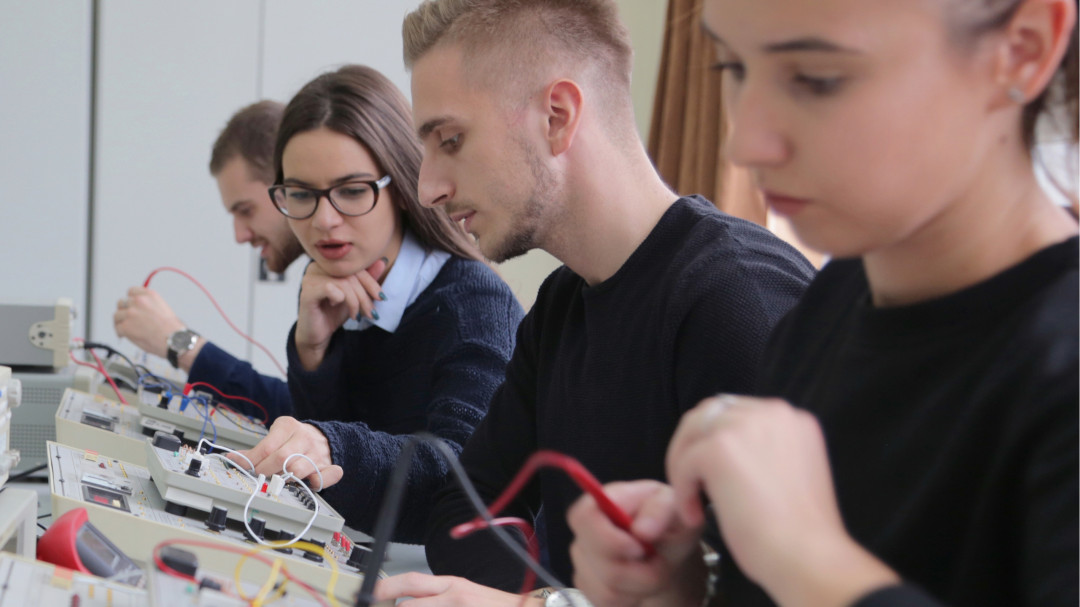
In the winter semester 2023/24, around 750,000 people, or around one in four students in Germany, were enrolled in a degree programme in the engineering sciences. This includes twelve fields of study, in addition to the two major subjects of mechanical and electrical engineering, also architecture and computer science.
Since the winter semester of 2020/21, the number of students in this subject group has been falling continuously, from 783,000 to currently 749,000. The number of first-year students has fallen by 13 per cent in a 10-year comparison. Engineering is considered to be at the heart of the German economy. This is one of the reasons why there have been numerous initiatives in recent decades by politicians and professional associations to encourage more young people to study engineering.
‘Unfortunately, these efforts have not been sufficiently successful,’ says Marc Hüsch, statistics and data visualisation expert at CHE. “Despite numerous campaigns in recent years, many engineering degree programmes have seen a decline in the number of first-year and current students.” “Computer science is an exception here, but even here, the number of students and graduates is not enough to meet the demand for skilled workers,” Hüsch continues.
The biggest loser in the engineering sciences subject group is the field of mechanical engineering/process engineering. With a drop of almost 16,000 first-year students in a 10-year comparison, there has been a decline of around 45 per cent in the numbers. To make matters worse, around a third of students in the bachelor's degree programme drop out. At the regional level, Mecklenburg-Western Pomerania and Rhineland-Palatinate have been particularly affected by the decline. Here, there were around 70 per cent fewer first-year students in mechanical/process engineering between the 2013/14 and 2023/24 winter semesters.
The CHE analysis also shows that 11 out of 12 fields of study in engineering have lost first-year students in a 10-year comparison. The only exception is computer science, which was able to increase its first-semester figures by 9,300 to 38,200 in the winter semester 2023/24.
‘We are observing a shift in student numbers for the entire field of engineering. The trend is moving away from traditional engineering courses such as mechanical and electrical engineering towards computer science – from hardware to software, so to speak,’ says study author Marc Hüsch.
The overall picture presented by the CHE shows that German universities are not producing enough graduates to fill both the current gap and the future demand for skilled workers in the engineering sector.
According to the authors, however, the situation would be even more challenging without the simultaneous significant increase in the number of foreign students, which is also particularly noticeable in the field of computer science. At 25.6 per cent, the engineering sciences subject group has the highest proportion of foreign students of all subject groups. In the field of mining/metallurgy, more than half of the students now come from abroad.
The comparatively high proportion of women among foreign students in engineering is also noteworthy. Almost a quarter of foreign female first-year students, but only a ninth of their German counterparts, began studying in the engineering subject group in the winter semester of 2023/24.
‘Foreign students can be an important part of the solution to the shortage of skilled workers in the engineering sector, but to achieve this, the issue must be approached in a targeted and strategic manner. Overall, efforts should continue to be made to make a degree in engineering as attractive as possible to both German and foreign prospective students,’ says Marc Hüsch, head of the study programme.
Targeted study concepts with different target groups in mind, such as professionals or students without a university entrance qualification, could contribute to this. Particularly in view of the already large number of foreign students, the development and expansion of English-language courses and further training for teachers in intercultural and language skills is important.

